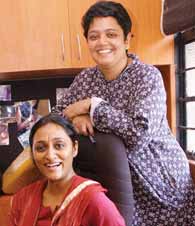|
Executive Interviews: Interview with Vandana & Vaishnavi on Women Executives
August 2007
-
By Dr. Nagendra V Chowdary
So, what's the role of leaders and
organizational policies in preparing
women? Who should anchor the role
of a cheerleader, a mentor and a
coach?
Nobody. Discrimination starts there. If
one just behaves that equality is
expected or assumed, things flow
smoother. There were enough women
movements across the globe, using
radical rhetoric and legal action to
drive out overt discrimination. But
most of today's barriers seem to be
insidious. Gender discrimination now
is so deeply embedded in
organizational life, as to be virtually
discernible. In a so-called "flatworld",
what needs to be done to wipe out
gender discrimination?
Deal with it paradoxically. Ignore.
And sue. Who are to blame squarely for
gender discrimination? Are men to
take the whiplash?
No. No one canmake you feel inferior
without your permission. Midway in life, between a thirdand
a-half of all successful careerwomen
in the US do not have
children. In fact, 33% of such
women (business executives,
doctors, lawyers, academics and
the like) in the 41-to-55-age bracket
are childless and that figure rises
to 42% in corporate America (as per
a study conducted Sylvia Ann
Hewlett in partnership with Harris
Interactive and the Nat ional
Parenting Association). The
findings are startling and troubling.
They make it clear that for many
women, the brutal demands of
ambitious careers, asymmetries in
male-female relationships and
difficulties of having children late
in life, conspire to dismiss the possibility of having children. Why
has the age-old business of having
babies become so difficult for
today's high-achieving women?
Because it is. And it doesn't stop
with having the baby they're
mostly left holding it! Is it true that most successful
men are not interested in acquiring
an ambitious peer as a partner?
Should the reverse be also
believed?
Yes. Just insecuri ty not
necessarily chauvinism. Women,
however successful, on the whole,
don't seem to ever let such
trivialities affect a relationship. Let's now look at wage disparities.
The persistent wage gap between
men and women is mainly due to
women being penalized for
interrupting their careers to have
children. In a study, economists
Susan Harkness and Jane Waldfogel
compared the wage gap across seven
industrialized countries and found
it was particularly wide in the US
(for instance, in France, women earn
81% the male wage, in Sweden 84%
and in Australia 88%; while in the
US, women continue to earn a mere
78% of the male wage). Why such
disparities when job expectations
(and outcomes too) do not differ gender-wise? What can help prevent
such disparities?
Go to court when it comes to any
discriminatory injustice if you don't
have the energy or resources to
mobilize public opinion or campaign
on this. Sue PhirMilenge style. How should working-women (more
sowith achievers and super-achievers)
strike a balance between their work
and life?
Stop functioning as superheroes for a
start! Just be "normal" behave like
any man in a similar position would.
There's no need to feed the general
unfairly high expectations! What can women managers learn
from 2002's Time magazine's "Persons
of the Year", Cynthia Cooper
(Worldcom), Coleen Rowley (FBI), and
Sherron Watkins (Enron)? Which of
their experiences, do you think, are
quite crucial?
Quite truthfully, we unfortunately
haven't read that Time and don't know
enough about them!
|
The Interview was conducted by Dr. Nagendra V Chowdary, Consulting Editor, Effective
Executive and Dean, IBSCDC, Hyderabad. This Interview was originally published in Effective Executive, IUP, August 2007. Copyright © August 2007, IBSCDC
No part of this publication may be copied, reproduced or distributed, stored in a retrieval
system, used in a spreadsheet, or transmitted in any form or medium electronic,
mechanical, photocopying, recording, or otherwise without the permission of IBSCDC. |
